Are you almost ready for your vacation and curious about what currency is used in France? Or what denominations French currency comes in? One of the first things you’ll want to get ironed out on your pre-trip checklist is the French money situation. Let’s talk about money in France including the currency used in Paris and all of France, where to get it, some best practices for France currency, and more money tips.
Currency in France
Does France still use francs? Nope! The euro has been the national currency of France since January 1, 2002. The euro is used in 19 of the 27 European countries that make up the European Union. Before that, the official currency of France for hundreds of years was the French franc (FF), but they are completely out of circulation and not accepted as legal tender anywhere.
That said, sometimes receipts still show the total amount in francs just for reference but that is phasing out and you see it less and less.
The French currency is made up of euro banknotes (bills) in the following denominations — 5, 10, 20, 50, 100, 200 and 500 — and coins are 1 euro, 2 euros, and 1, 2, 5, 10, 20, and 50-centime pieces.
The euro currency symbol is € and it comes before the amount. In France, you’ll often see a comma used in place of where we’d use a period in the US and vice versa. Like this, €1.000,35.
At the time of writing this, 1 euro=1.12 USD . The euro has always been stronger than the dollar, sometimes significantly so. You can check www.xe.com for current exchange rates of France currency.
FUN FRANCE CURRENCY FACT: Euro bills are different colors and sizes so they can be easily identified at first glance. Also, unlike American coins, euro coins get wider in diameter as the amount increases. So the 1-centime coin is smaller than the 2-centime coin, and all the way up.
They also have the amount clearly visible on the coin (unlike US coins) so you know if you’re grabbing a 2 or a 5-centime coin.
Using credit/debit cards in France
Visa and Mastercard are widely accepted in France and French people often pay by debit card, which is commonly referred to as a carte bleue. In large cities (or big retailers like department stores), American Express is accepted as well, but do note that it’s not accepted everywhere, so have a backup payment method just in case.
The only places I sometimes have trouble using American cards — even chipped ones in 2022 — are at gas stations, parking garages and toll plazas. As I said, always have a backup card and some cash on you for times like these when you run into trouble with money in France.
Gas stations have an attendant during the day so you can pay in cash. Toll plazas also accept cash, but make sure you don’t go through the “cards only” lane in that case. I did a whole video on driving in France here.
American debit cards with a chip and PIN work at most French ATMs (le distributeur), but be aware that some impose a transaction fee of a few euros. You’ll most commonly get 10, 20 and 50-euro bills and often have the option to choose what combo of bills you’d like — a mix of smaller bills or mostly 50s.
I’ve found it’s best to let your home bank know you’re traveling ahead of time so there’s no chance of your card being blocked due to fraud concerns.
***IMPORTANT TIP***: If you’re using a non-French debit card to withdraw cash (or pay for anything anywhere), if presented with the option to complete the transaction in the local euro currency or in US dollars, always choose the local euro currency. The exchange rate will be in your favor.
It may be tempting to choose dollars out of habit, but the exchange rate is inflated when it’s converted to dollars at the point of sale and you’ll end up paying significantly more. Let your home bank do the conversion instead by choosing to pay in euros.
It also pays (quite literally!) to give the hotel employee or waiter at touristy places a heads up that you’d like to pay in euros ahead of them running your card. That way you’re 100% sure you’ll be charged in euros.
At the Marriott at the CDG airport, I was busy getting my things together when it was time to pay and didn’t realize until after I left that they ran my card in United Staes dollars. I ended up paying about $40 more than I would have if it had been run in euros. Sometimes they think they’re doing you a favor by automatically letting you pay in your home currency, but it’ll end up costing you more.
Banks in France
Here’s a list of the most common banks in France:
–Crédit Agricole
–BNP Paribas
–LCL
–Société Générale
–Caisse d‘Epargne
–Crédit Mutuel
–CIC
–HSBC
–Banque Populaire
–La Banque Postale
Banking oddities in France >>
French banking hours might be a bit different than what you’re used to, so if you need banking services, take note. Most banks in big cities are open from 9 or 9:30 a.m. until 5 or 6 p.m. Tuesday through Friday as well as Saturday morning. French banks are generally closed on Sunday and often Monday as well, especially in smaller towns.
Something else you’ll commonly see is that they’re closed from about 12:30 until 2 p.m. during the week for lunch.
Out where I live, my bank is open Tuesday through Friday, 10 a.m. until 1 p.m and then 3 until 6 p.m. just to give you an idea of what to expect.
Where to exchange money in France
You have a few options to get euros, France’s currency for Paris or elsewhere:
1. Withdrawing euros directly from an ATM upon arrival with your US debit card. This is my favorite option for quick cash because it’s easy, cost effective, and readily available 24/7. My US bank, CapitalOne, doesn’t charge any fees. You get the current exchange rate without anything else added on.
If you need large sums of currency for Paris, this may not be the best option because banks usually have a 24-hour limit on how much you can withdraw. But for several hundred euros at a time, this is my go-to recommendation for French money.
2. Currency exchange shops. In big cities like Paris, money exchange shops (NOT in the airport!) will give you a good rate, they’re quick, and they deal in a wide variety of currencies. You’ll find shops near tourist attractions, making them a convenient option for getting Paris currency fast.
Currency exchange offices are a good place to exchange a large amount of money if you have a need for it. But it also means you’ll need to bring dollars with you on the plane to exchange, so depending on your comfort level of carrying cash on you, this might not be the best option for getting money in France.
Most are open during normal business hours. Rates are good but if you want to get the best deal, go for option #1 above for French currency. That said, the euro/USD exchange rate right now won’t make you weep like in years past, so paying a small percentage in fees or getting a less advantageous exchange rate might not be that big of a deal in the whole scheme of things.
Do what’s best for your financial situation and comfort level.
Tom and I have personally used Yes Change for currency in Paris and they’ve always been great. Some exchange places charge a commission on top of a slightly inflated exchange rate, so read the fine print. Not all French currency exchange shops will give you the same bottom line rate.
3. Exchanging money at your home bank before you leave. This is not the best option these days, especially if you want to save money. American banks will usually sell you euros at an inflated rate with transaction fees. But I know many people are more comfortable having some euros on them before touching down in Europe, so this is an option if you’re nervous about not having any euros in cash ahead of time.
Honestly though, I’ve never (knock on wood) had an issue using my American debit card at a CDG airport ATM upon landing. Just make sure you go to an official bank ATM (note list of banks above) and not one of the independent ones inside a store which will charge fees.
4. Airport money exchange kiosks. I’m listing this because it’s an option for getting foreign currency, but I don’t recommend it. Whatever you do, stay away from airport money exchange kiosks unless absolutely necessary.
The exchange rates are terrible, so unless you’re OK with losing money or it’s an emergency, steer clear! Along with this, I’d put hotel front desk money exchange services in the same category. The rates won’t be great at all.
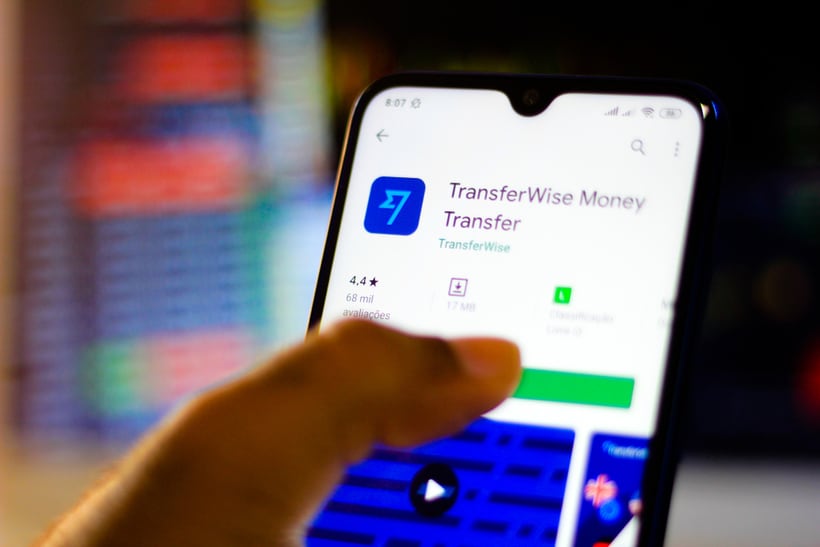
Photo credit: Shutterstock.com / rafapress
FRANCE CURRENCY PRO TIP: For frequent travelers, I can’t recommend a Wise (formerly Transferwise) debit card enough. You can easily transfer money in a matter of seconds via their app for an international money transfer and have it available to you on your Wise debit card in whatever currency you choose.
It’s the easiest way to have money in France available to you the minute you get off the plane. Their fees are also some of the lowest in the industry and they have the best exchange rates. With the euro at an all-time low, it’s a no-brainer. I did an entire Wise review here, so check it out for more on how to get local currency.
Do you tip in France?
I wrote an entire article on tipping in France here. But bottom line is that tipping in France is done on a much smaller scale than what’s considered normal in the US. Most notably, you do not leave a 20% tip at restaurants in France because waiters make a livable wage and don’t depend on tips to live.
It’s perfectly acceptable to round a café bill up from 4.10 to 5 or leave a few euros for great service. At a very nice restaurant where you had a great meal, you can certainly leave a few extra euros, but anything more than 5 or 10% of the bill would be very unusual (but not rude).
The French do not leave 20% at when eating out at restaurants. But that said, you aren’t a French person and you’re here on vacation, so do what feels right to you. Keep in mind that if you are living in France or here for an extended period of time, it might make sense to handle tipping like the French do.
The vast, vast majority of French people do not leave a tip at the hair salon or nail salon and as I mentioned 20% would be very rare at a restaurant. Tipping isn’t considered rude at all, but it’s done way less frequently here and at a lower percentage. Paying the exact bill at a restaurant and leaving 0 as a tip is pretty commonplace, especially at a casual restaurant. I usually leave 5-10% for a great dining experience.
When it comes to the hospitality and other services, here’s what I do: Definitely tip your cab driver 10-15%, your hotel bell hop 2-3 euros/bag, a few euros for room service and a daily tip for housekeeping.
I personally always tip food delivery drivers a few euros depending on the order and they are pleasantly surprised. Use your discretion.
Other money in France tips
–When paying for something that’s just a few euros such as a couple of baguettes, coins and small bills are appreciated. While you might be able to pay with a 50 at a busy bakery, they aren’t always able to make change and sometimes you can only use your card when you hit a certain minimum purchase amount. Keep small denominations and coins on you for your bakery runs.
–Don’t forget about the VAT refund. It’s a great way to save even more money on any shopping you do in France (airport or anywhere). I highly recommend Wevat, a free app that will refund you more money than the traditional VAT refund method. I talk more about that in this post about saving money in France.
–It’s very common to use the contactless payment (sans contact) debit card feature pretty much everywhere in France. If you see the symbol on the payment terminal and your card is equipped for contactless payments, feel free to use it.
–When it’s time to pay at a restaurant, servers will most often bring the portable payment processing device to your table so your card is never taken out of sight. You just insert your card tableside, validate the payment, and that’s that.
–If your bank or money exchange place tries to give you 100-euro bills or higher, politely decline and ask for smaller denominations. Nothing over 50 is used in everyday life and you’ll have a difficult time getting places to accept 100-euro bills or higher.
–A quick word on traveler’s checks… don’t use them! In years past, they made a lot of sense but they’re outdated and won’t be widely accepted. Use your debit/credit card instead.
***
Hope that helped get you up to speed about what currency is used in France! Where do you exchange money in France? Have any Paris currency or French money tips to add?
***If you want to be even more prepared for your trip to France, check out my eGuide with even more France travel tips to know before you go!***
PIN my currency for Paris and money in France post:
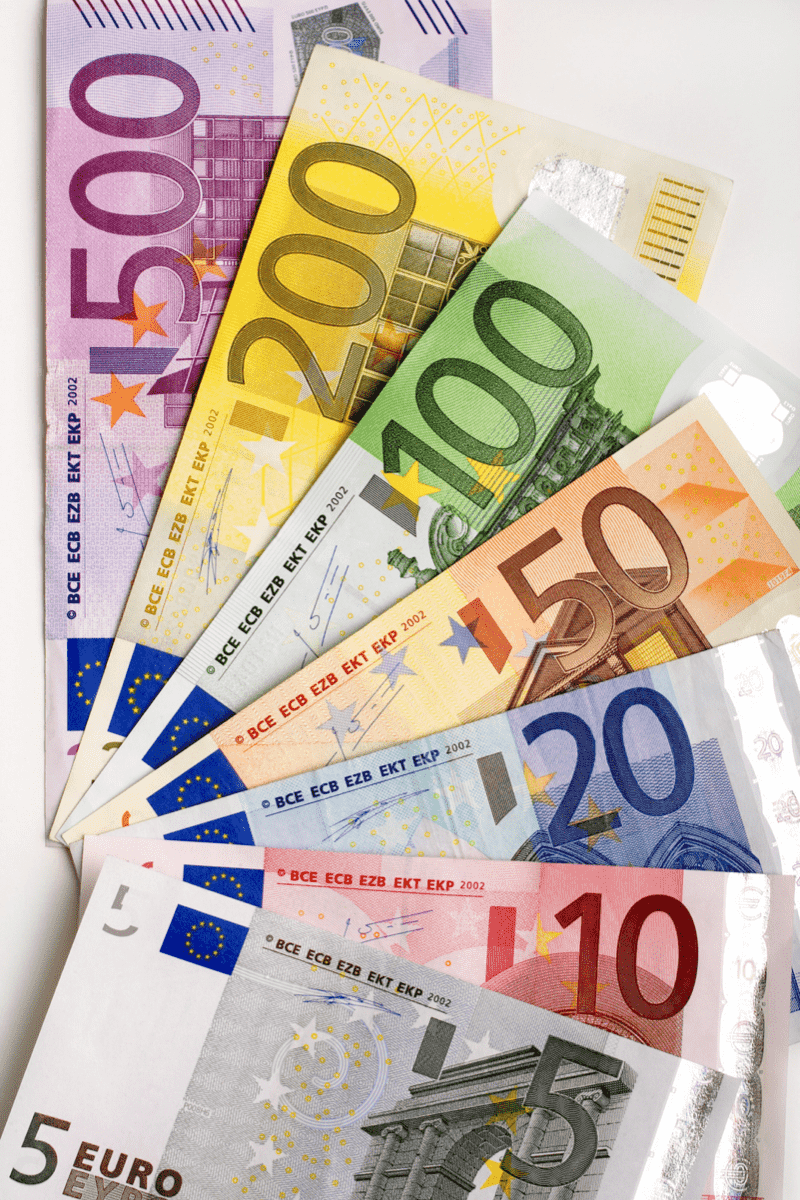
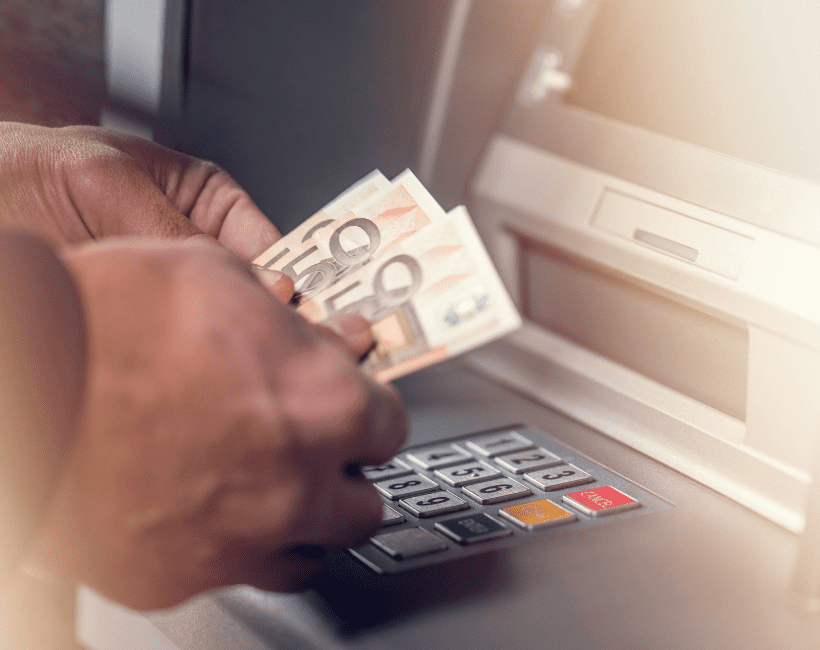
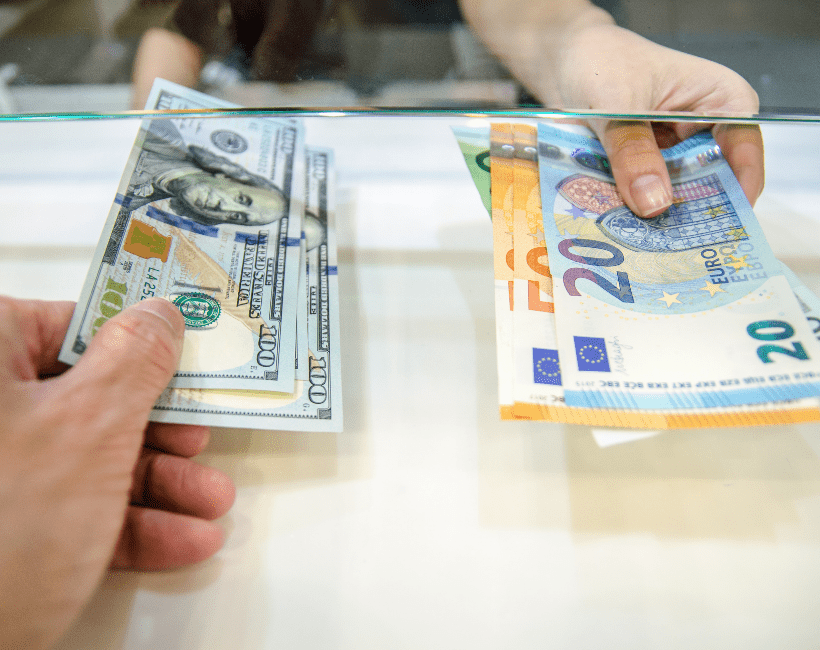
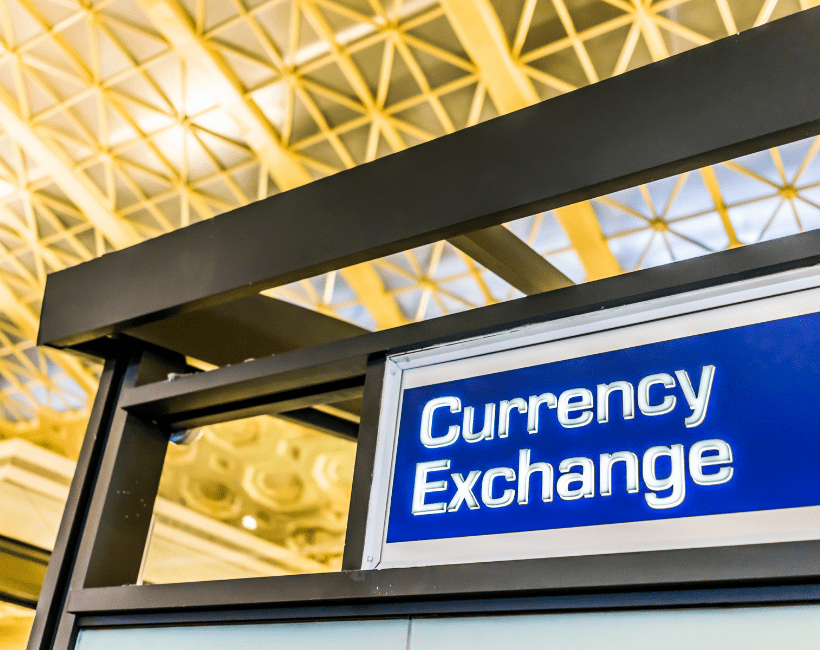
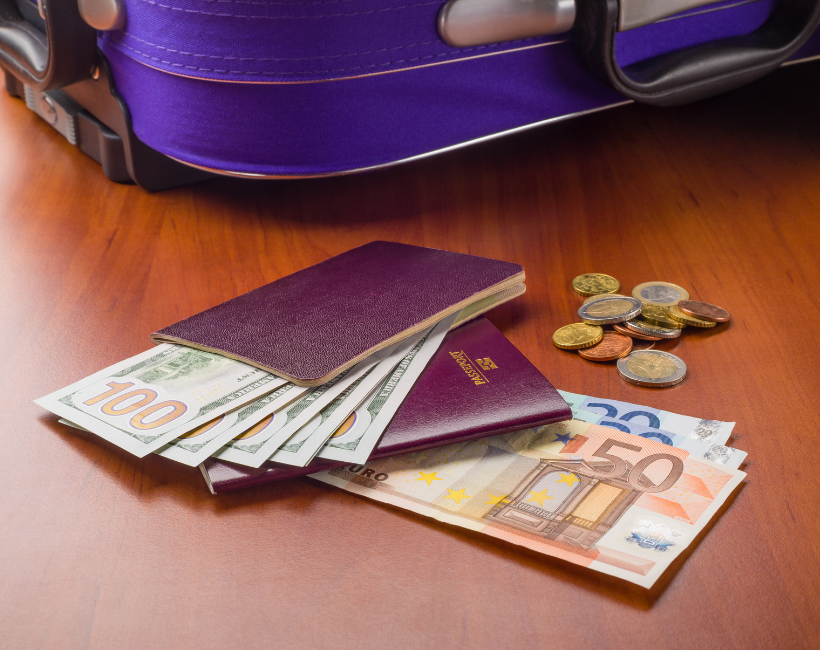






Merci infiniment for answering so many questions I had! We are going to be traveling on our own for half the trip in May and I was a bit concerned about best practices and pitfalls to avoid. I’ve bookmarked this blog post to re-read right before we leaves
You’re very welcome and so glad it was helpful. Have a great trip!
Very interesting. int eh past, I’ve always ordered foreign currency from my bank, with a fee. For my trip to France in September, I’ll plan on using a bank ATM at CDG.
I found this interesting
It’s a good idea to check with your US bank to find out what fees they charge on using ATM machines outside the country. Larger US banks will often have designated partner banks in other countries and will charge extra fees if you use any ATM not owned by one of those designated banks. For example, Bank of America customers should try to use BNP Paribas ATMs whenever possible in France, as that way BofA won’t charge any extra fees (aside from the currency conversion fee, which you can’t avoid). This is easy in Paris, but can be more difficult in other parts of France, particularly outside of larger cities. I think I ran into that when I spent a week near Ambert, for example.